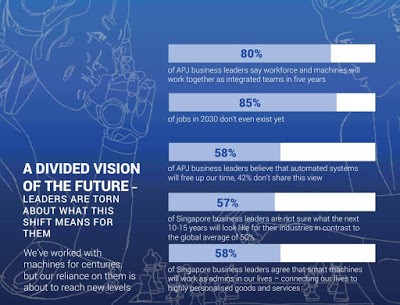Eight in 10 Asia Pacific and Japan (APJ) leaders expect humans and machines will work as integrated teams within their organisation inside of five years
- While 58 percent of APJ business leaders believe that automated systems will free up our time, 42 percent don’t share this view
- Nearly all APJ leaders – 97 percent – believe that technology will change the way we learn, globally
- Seven in 10 (71 percent) APJ business leaders say schools will need to teach how to learn rather than what to learn to prepare for jobs that haven’t been created yet
- Six in 10 (63 percent) APJ business leaders agree that new learning resources, such as online, peer-to-peer, boot camps and massive open online courses will replace university learning
- Singapore organisations united in need to transform and how, but not moving fast enough: only one in five believe they are leading the way, ingraining digital in everything they do

Source: Dell Technologies infographic. APJ leaders have a divided vision of the future)
Dell Technologies has found* that almost half (48 percent) of Singapore business leaders believe they will have more job satisfaction in the future by offloading the tasks they do not want to do to machines, while 52 percent disagree. Findings pointed towards how a truly mutually beneficial partnership is on the cards – if businesses prepare accordingly, the company said.
The quantitative research conducted by Vanson Bourne follows Dell Technologies’ seminal story, Realizing 2030: The Next Era of Human-Machine Partnerships. The study forecast that by 2030, emerging technologies will forge human partnerships with machines that are richer and more immersive than ever before, helping us surpass our limitations. Business leaders in the APJ region agree: 80 percent of respondents expect humans and machines will work as integrated teams within their organisation inside of five years.
But business leaders are also split by whether the future represents an opportunity or a threat, and torn by the need to mitigate these risks*. For instance:
- While 58 percent of APJ business leaders believe that automated systems will free up our time, 42 percent disagree
- Fifty-seven percent of Singapore business leaders are not sure what the next 10-15 years will look for our industry in contrast to the global average of 50 percent
- Fifty-eight percent of Singapore business leaders agree that smart machines will work as admins in our lives – connecting our lives to highly personalised goods and services
Paul Henaghan, VP, APJ Data Centre Solutions, Dell EMC said: “As technology improves and automation becomes more prevalent, emerging technologies like artificial intelligence (AI) and the Internet of Things (IoT) will open up new frontiers in Singapore and on a global level. Based on the many conversations I have with customers, I believe we’re reaching a pivotal moment in time as our reliance on machines will be characterised by even greater efficiency and innovations than ever before. This will require businesses to transform their IT, workforce and security to take the lead in the decades to come.”
The findings also revealed Singapore business leaders’ attitude to the future of skills. Seven in 10 (71 percent) believe that schools will need to teach students how to learn rather than what to learn to prepare them for jobs that do not exist as yet, compared to the global average of 56 percent.
Collectively, respondents predict that machines will assume work functions in finance, inventory, logistics, administration, customer service, marketing, human resources (HR), medical care and more to alter the course of education. Society will enter a new phase that will be characterised by “in the moment” learning as the pace of change will be so rapid that new industries will be created and new skills will be required to survive:
- 97 percent believe that technology will change the way we learn by 2030, globally
- 1 in 2 APJ business leaders are split on whether their employees will learn on the job with AR
- 61 percent of APJ business leaders agree that education is evolving and more so in Singapore, 71 percent of business leaders say schools will need to teach how to learn rather than what to learn to prepare for jobs that haven’t been created yet
- 63 percent of APJ business leaders agree that new learning resources, such as online, peer-to-peer, boot camps and massive open online courses will replace university learning
When, where and even why people work is changing dramatically. While employees previously had to work within the confines of a traditional office environment, companies are increasingly adapting to their workers’ needs and increased mobility.
Hajar Ali, founder of luxury adventure travel company Urbane Nomads, brought these trends to life with the latest XPS 13 in a #FutureOfWork showcase at the event. He discussed the role of technology in powering a solopreneur’s lifestyle to increase productivity while fuelling creativity. Said Hajar: “The deskbound days of nine-to-five workers are gone for most modern businesses and I’m no exception. Technology is empowering a new generation of ‘nomadic entrepreneurs’ who work on-the-go without the need for a physical office space. The flexibility to work from multiple locations is critical for my business without having to compromise on performance – the Dell XPS 13 delivers on both.”
A CES 2018 Innovation Award honouree, the XPS portfolio has won more product awards than any other brand in the company’s history. Along with an InfinityEdge 4K Ultra HD display, the XPS 13 adds a Rose Gold with Alpine White woven glass fibre interior as an option to traditional silver and black, with narrower borders and up to 80 percent more thermal headroom. Inside its thinner, lighter design, the Dell Power Manager helps the on-the-go pro worker to attain new levels of productivity.
Dmitri Chen, COO and VP Specialty Sales, APJ, Dell EMC said at the launch, “Today, the shift to digital is transforming industries around the world. Even established technology companies need to constantly reinvent themselves to innovate like a start-up and deliver like an enterprise. By focusing on areas such as modernising IT and adopting a culture of learning, technology companies can stay a step ahead and remain competitive.”
Pang Yee Beng, Senior VP – Commercial Business, South Asia & Korea, Dell EMC, and MD, Dell Malaysia stated, “The modern workplace is in the midst of unprecedented change. People do not want to be confined by a physical location anymore and companies are increasingly adapting to their workers’ needs and mobility demands. Technology has a significant influence on the way people work and it is driving productivity, impacting employee experience, customer experience and revenue growth ultimately. Workforce transformation needs to be a deliberate strategy to promote a more flexible work environment realising human potential.”
David Yeo, Chief Learning Architect, Kydon Group, a Singapore training and learning company, added: “Learning will no longer be the unidirectional consumption of content from knowledge gurus. Instead, everyone will have to co-create value in a networked learning ecosystem to make themselves more relevant, and to make organisations they serve in more competitive. Creating this new competitive edge will be through the empowerment of new generation learners with new tools for thinking and collaboration.”
Read original article here



